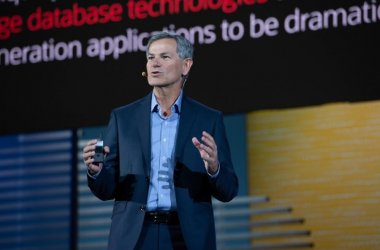I was back on my travels last month — Florida, to be exact. I was one of the 20,000 people present at Sapphire Now. You probably didn’t see me.
Here’s something educational — America is a big place, and America does big events. The convention centre in Orlando is the size of Dubai, the mounted screens are the size of buildings, and the show floor is the size of a shopping centre.
This isn’t rare for America — just order a medium-sized McDonald’s in any state and you’ll see that generally the scale of the States is incomprehensible, especially to a young chap from England (a small island somewhere in Europe).
Add to this the personalities. Americans have wonderfully large personalities — they were built for TV. Booming lungs with whisky vocals, rumbling laughs and back-slapping anecdotes.
SAP’s American Co-CEO, Bill McDermott, is one of these. When he steps on stage, you’re guaranteed a number of woop woops and hell yeahs — it’s the American way.
“Mobile [moball, as he says], Big Data [big datter, as he says], and cloud [he says that normally] are game changers! Woo!”
The enthusiasm of Americans is really contagious — even for a cynic like myself, who finds sheer joy in frowning at adverts and using the word “ghastly” at any opportunity. And the enthusiasm around things being big just so happened to grab my attention at this event. I’m talking about big datter, sorry, data (it really is contagious).
However, my attention was grasped less on the glory and more on the gloom. The fact that this technology gives companies the ability to personally research, approach and divulge individuals’ lives — online or not — does beg the question, what are the ethical implications?
I spoke with an executive at SAP and he told me about a new mobile service it’s running with HANA, which will see it team up with service providers all over the world. The gist is that it will take data from all subscription-based devices being used in certain places, apply analytics to that data, work out exactly who these people are and what they’re doing, allowing companies to then manipulate and carve personalised advertising and seamlessly slip it into their paths, unbeknownst to the user.
Perhaps the word “manipulate” is a touch harsh, but not inaccurate. This technology will allow companies in the future to create a totally personalised world — much like a sci-fi movie. It could, eventually, tell you exactly what food you should eat on any given day, how much exercise you must do, or whether or not you should pay the doctor a visit for any number of reasons.
Imagine a world where every single thing you interact with is strategically placed there as a result of someone watching your every move. It’s basically the plot to The Truman Show, but instead of cameras watching you, it’s your smartphone and your tablet.
SAP did tell me, it must be said, that for this particular service, it will demand total anonymity. SAP won’t receive any data from the service providers — all the personal data will be extracted before it’s passed on. So essentially SAP will have raw data, not personalised data. But that still won’t restrict it from being able to provide the service providers with exact information on its customers. And what’s more, the service providers will already have the personal information anyway; they’re just getting SAP to do the dirty work. It’s like hiring a private detective to spy on your wife.
The political, cultural and social impact that Big Data can have is overwhelming.However, regulations surrounding consumer data privacy may need to be reconsidered. Another concern that this raises is that regulations will, of course, be different geographically, causing confusion around what’s allowed and what isn’t allowed depending on where people are doing business.
Where this leads in the future, I couldn’t possibly say. However, if a man with a sandwich board starts to appear around every corner I turn, I might have to consider dumping my smartphone.






